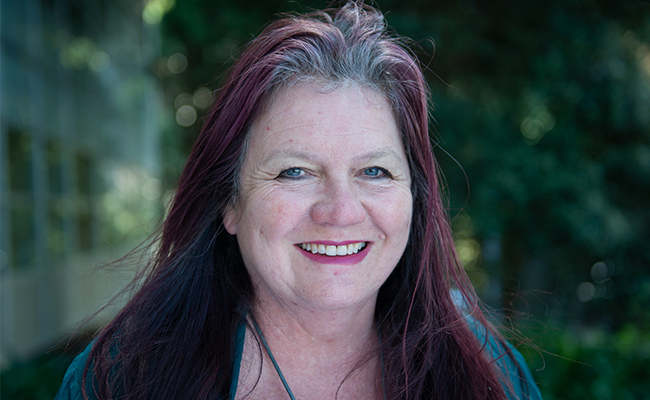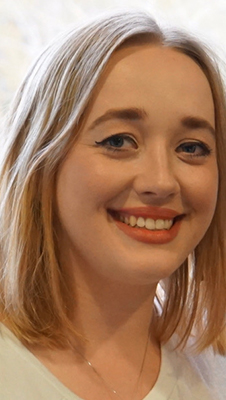
Lesley Gray, a Senior Lecturer in the Department of Primary Health Care and General Practice at the University of Otago, Wellington.
Third-year medical students have been given a unique opportunity to become field assistants for a COVID-19 research project, conducting virtual interviews with community groups about the impact of the pandemic on their organisations.
Lesley Gray, a Senior Lecturer in the Department of Primary Health Care and General Practice at the University of Otago, Wellington, has a 'rapid response' grant from the Health Research Council of New Zealand and the Ministry of Health to capture factors influencing New Zealanders' ability to physically distance and take actions advised or mandated in the Government response to COVID-19.
She is one of the convenors of Community Contact Week (CCW), a long-standing highlight of the third-year Early Professional Experience (EPE) programme for Bachelor of Medicine and Bachelor of Surgery (MB ChB) students. The CCW team came up with the idea of inviting the medical students to assist with the research. Lesley developed the idea with the other convenors, Associate Professor Hamish Wilson, Dr Nigel Thompson and Lis Heath, the EPE lead tutor.”
“We knew a lot of the organisations would probably be talking to the students this year about the impact that COVID-19 has had on them, their organisation, and their clients or patients, so we decided to put in an ethics application to invite the students to work as field assistants,” she explains.
All third-year medical students were invited to assist with the research during their community placements in rural and provincial towns.
This year proved to be a little different, as just as students were preparing for their usual week of community immersion, the country's COVID-19 Alert Levels shifted, with Auckland moving into Alert Level 3 and the rest of the country into Alert Level 2.
“It became apparent that in-person meetings were not going to be happening, so of course the students were very, very disappointed, and the convenors and tutors were having to work out an alternate virtual week.”
The programme was rapidly reorganised, with the 24 students who volunteered to be field assistants conducting interviews with community organisations in the lower North Island and throughout the South Island by phone or by Zoom.
Representatives of the 120 organisations who agreed to take part would be asked how the COVID-19 outbreak and the government's response had affected the work of their organisations and the people served by their organisations.
Lesley says with the shift to online it was still possible to interview 90 of the consenting organisations. Those interviewed covered a broad spectrum of the community, from funeral directors to health professionals to local sports coordinators and aged residential care providers.
“The participating organisations were delighted to have the opportunity to contribute to this research and to be able to give their perspective on how lockdown and how COVID-19 had impacted their organisation.”
Medical student Millie Taylor was one of those who welcomed the opportunity to volunteer as a field assistant.

Medical student Millie Taylor.
“It was interesting being involved in the project and hearing unique viewpoints about the pandemic that may not have been portrayed in mainstream media.”
Lesley says all third-year students, whether or not they signed up to be field assistants, were able to benefit from the research protocols in the revised unit guide and to explore the responsibilities of being a research field assistant.
“All students had some learning opportunities around research and research ethics. They had a tutorial session where they could practice interviewing each other and they were able to learn about research protocols as well as the practicalities of how to make an audio recording and transfer audio files securely.”
Lesley says the field assistants will be presented with certificates and will be able to add their research experience to their CVs. Future third-year students will also be given the opportunity to participate in the research project as 2021 follow-up interviews with organisations are planned.
Lesley says preparing students for the research roles was a learning process for everyone.
“We had to make sure that the field assistants had enough knowledge of the research process as well as making sure that students all had the same learning opportunities and weren't disadvantaged if they chose not to be field assistants.”
Lesley plans to enlist a third-year student to assist in analysing the research material over the summer break, and will also offer field assistants the opportunity to assist with writing up the final research report.
She says she is enormously grateful to the community organisations, all the tutors in the Early Professional Experience programme and the students for making the project possible.
“This was a massive undertaking and would not have been possible without the input of many.”
Lesley has issued her thanks in particular to the following University staff:Colleen Bradley and Rose Collier, the Medical School Administrators who enabled the transition from in-person to virtual interviews at very short notice – and who supported the additional aspects relating to the research.
Fraser Brown, a Senior AV Technician, and other staff in IT Support Services, who assisted with setting up multiple Zoom addresses and organised a live-stream meeting between Lesley in Wellington and third-year students in Dunedin.
Richard Feist, Senior Manager IT Assurance & Cyber Security, and Information Security Officer Mark Bedford, who assisted with data security questions for students working as field assistants.
Associate Professor Maria Stubbe from the Department of Primary Health Care and General Practice at the Wellington campus, and Gary Witte, Manager, Academic Committees and Services Office, who gave advice on the ethics application.
Associate Professor Grant Butt, Director of the Early Learning in Medicine programme, who supported the shift to 'virtual' community immersion.
And to all 24 of the CCW third-year MB ChB students who participated as research field assistants in the 2020 HRC/MoH funded research, including: Annabelle Sik, Ashleigh Goh, Brydie Keenan, Katie Reed, Denzel Chung, Dikshya Parajuli, Lizzie Stevenson, Hannah Moreton, Indira Fernando, Jacob Larson, Josh Chuah, Bernard Reyneke, Maddie Slater-Carter, Maggie Lindbom, Mishal Bajunaid, Millie Taylor, Neakiry Kivi, Sophie Mills, Tess Shepheard, Venus Cahusac de Caux.
